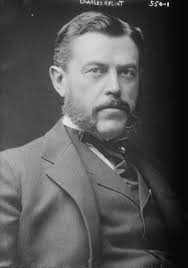The Father of Trusts: How Charles Flint’s IBM Changed Computing
If you ever owned a desktop, used an ATM or Hard disk, chances are you used an IBM technology. The International Business Machines Corporation or IBM has been in the business for over a century with connections in over 170 countries. This American giant is one of the world’s largest manufacturers of computer hardware. So how did the company grow to become one of the biggest employers in the world? Here’s a look at the growth of IBM, and how the company changed the world.
Nicknamed Big Blue, IBM is a part of the Dow Jones Industrial Average and employs over 350,000 employees. The company is a research giant with employees having won Nobel Prizes, Turing Awards, and National Medals. All of this came to be thanks to a serial investor who had great business sense.
About the Founder
Charles Ranlett Flint was born in 1850 in Maine. The family soon moved to New York, where his father worked as the manager of a firm called Chapman & Flint. The family was business was set up in 1837, and served as a mercantile firm dealing in loans and fiscal help. Flint finished his graduation from the Brooklyn Polytechnic Institute in 1868, and two years later entered the shipping business. His first venture was as a partner in the firm Gilchrest, Flint & Co., which later became W.R. Grace & Co.
Between the years 1876 and 1879, he also served as the head Chilean consul at New York, and as a consul general for Nicaragua.

He brought several companies together via a merger and formed U.S. Rubber in 1892. A year later, he helped manufacture naval ships for the Brazilian Republic. He also helped Japan in the First Sino-Japanese War by getting them ships. His business acumen kept growing as he learned the ways of the trade. In 1899, he established American Chicle by merging Chiclets, Beemans, Dentyne and Adams Chewing Gum. He also played a part in the forming of American Woolen in the same year. But his greatest invention came a decade or so later.
Beginnings of IBM
Flint changed the way the world worked by forming the Computing-Tabulating-Recording Company in 1911. The company came to be via the merger of four different companies. This Goliath would later grow to become IBM, the company that revolutionized the field of personal computing! A decade later, CTR would rename itself International Business Machines, and the rest is history. Flint continued to work as a part of the board of directors at IBM until 1930.
Growth of IBM
Initially, the company made machinery like time recorders, slicers, and tabulators. After Thomas J. Watson, Sr became the President, the company went huge, bringing in $9 million, which is worth $130 million today every year.
The company also expanded to Europe, Asia, and Australia. Watson was also responsible for re-christening the Computing-Tabulating-Recording Company to International Business Machines. By 1937 IBM’s equipment was helping companies deal with massive amounts of data. They helped the US Government maintain employee records, and the names of Nazi sympathizers, during the 1940s.
Thomas Watson, Sr., stepped down in 1952, after 40 glorious years, and his son took over. By 1956 the company started working on artificial intelligence through IBM 704 and within a year, they developed FORTRAN. IBM was also responsible for the development of the highly successful Selectric typewriter. During the 1960’s IBM helped NASA with their logistics and was a part of the Gemini and Saturn flights.
Computer Revolution
They came out with the first PC in 1964, called the IBM System/360, following it up with the IBM System/370 in 1970. Both these models were responsible for making the concept of mainframe computing popular around the world. In 1993 IBM posted a US$8 billion loss which was the highest loss by an American company at the time. But the company turned its fortunes around through smart decision making.
In 2005 Lenovo acquired rights to IBM’s PC business and switched over to software development by acquiring SPSS Inc. The company celebrated its 100th anniversary in 2011, and bought SoftLayer Technologies, for $2 billion. They are now working in partnerships with several companies such as Apple Inc., Twitter, Cisco, and Facebook.
Flint’s fluency with handling financial dealings, earned him the nickname Father of Trusts. Honestly, if not for Flint, the world would still be decades behind with respect to computing technology. The company he formed changed the way people looked at personal computing. In many ways, Flint was responsible for starting the Digital Age, which we all cherish and celebrate!
In 2005 Lenovo acquired rights to IBM’s PC business and switched over to software development by acquiring SPSS Inc. The company celebrated its 100th anniversary in 2011, and bought SoftLayer Technologies, for $2 billion. They are now working in partnerships with several companies such as Apple Inc., Twitter, Cisco, and Facebook.
Flint’s fluency with handling financial dealings, earned him the nickname Father of Trusts. Honestly, if not for Flint, the world would still be decades behind with respect to computing technology. The company he formed changed the way people looked at personal computing. In many ways, Flint was responsible for starting the Digital Age, which we all cherish and celebrate!

Being a cinephile with a love for all things outdoorsy, Athulya never misses a chance to chase inspiring stories or poke fun at things, even when the subject is herself. Currently pursuing a degree in mechanical engineering, she is someone innately interested in technical and scientific research. Music reviews and op-eds define her as they allow her to explore different perspectives. Though sometimes she thinks she makes more sense playing the guitar than she does while writing.
